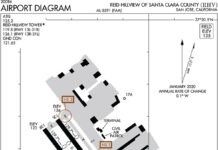Acknowledging that the Covid-19 pandemic shows few signs of abating and that meeting currency requirements and renewing expiring medical certificates poses additional risk of infections, the FAA on June 25 published a revision to its April 30 special federal aviation regulation (SFAR) 118 designed to allow flight operations of many types to continue. As we noted when discussing the original SFAR in our June 2020 issue, the new SFAR “recognizes the incompatibility of flight training with social distancing” and provides grace periods for flight reviews plus alternative compliance methods for instrument proficiency and other requirements.
According to the new rule, SFAR 118-1, “Except for medical certification, no individuals who obtained relief under the original SFAR will receive an extension of that relief.” Instead, the agency said, “SFAR 118-1 applies to new persons who may have challenges complying with certain training, recent experience, testing, and checking requirements. This relief allows operators to continue to use pilots and other crewmembers in support of essential operations during this extended period. This SFAR also provides regulatory relief to additional persons unable to meet duration and renewal requirements due to the public health emergency.” The table below highlights some, but not all, of the pending expiration dates the FAA has extended with the new SFAR.
As with the original version of SFAR 118, it applies primarily to pilots exercising the privileges of at least a commercial certificate. Pilots engaged in operations requiring only a private certificate but seeking the SFAR’s relief also may benefit but only if they have at least 500 hours of total time as a pilot, of which 400 hours is as PIC and 50 of the PIC hours were accrued in the last 12 calendar months. Additionally, the private-pilot operations benefiting from the extensions must be incidental to business or employment, support family medical needs or involve transporting essential goods for personal use, be necessary to relocate an aircraft or transport essential goods and/or medical supplies supporting public health needs.
“The FAA recognizes that there are aviation operations outside of air carrier and commercial operations…that are critical, including operations that support essential services and flights that support the COVID-19 public health emergency response efforts,” the agency said in the new SFAR. “These operations are likely to face disruption due to a decreased supply of qualified pilots resulting from the effects of the COVID-19 public health emergency including the reduced number of personnel available to administer required training, checking, and testing. Without the relief in this SFAR, beginning July 1, 2020, and with each month thereafter, a new group of pilots will become unavailable to perform critical operations due to an inability to comply with regulatory requirements. This SFAR will provide temporary relief to certain individuals whose qualifications would otherwise lapse, to ensure there are a sufficient number of qualified personnel available to conduct essential aviation activities during this period,” the FAA added.
The new SFAR and its extensions results at least in part from coordinated requests from aviation industry organizations. For example, in a May 29, 2020, letter from six aviation trade associations, industry representatives noted “more than 57% of [designated pilot examiners] are over the age of 60, a demographic at higher risk of severe effects” from the pandemic. Those organizations include Aircraft Owners and Pilots Association (AOPA), Air Medical Operators Association (AMOA), Experimental Aircraft Association (EAA), Helicopter Association International (HAI), National Agricultural Aviation Association, National Air Transportation Association (NATA) and National Business Aviation Association (NBAA).
It’s not at all clear that the FAA would entertain yet another extension of related deadlines. In the latest SFAR, the agency noted that “limited extensions, not to exceed 3 calendar months (grace months), for training, checking, and currency requirements are acceptable in these extraordinary circumstances. Further extending the grace period provided to the original group of airmen covered by SFAR 118, however, presents an added risk to the system that the FAA does not broadly support. The grace months provided by the SFAR were to offer flexibility in scheduling the necessary events given the disruption caused by the COVID-19 public health emergency. Certificate holders should seek to schedule those events as soon as it is practical and safe to do so given individual circumstances.”
FAA Shortens VFR Chart Publication Cycle

Beginning February 2021, the FAA will abandon its six-month to two-year revision cycles for its VFR chart products—sectionals, VFR terminal charts, etc.—and shorten it to 56 days. According to AOPA, the change is designed to streamline the current chart update process and help prevent them from becoming obsolete well before they expire. The association said the FAA expects to realize a cost savings by eliminating related chart bulletins and Notams.
“AOPA has been advocating for this change and working with the FAA to move toward a 56-day cycle for some time and appreciates the FAA’s willingness to work collaboratively to bring about one of the biggest changes to visual charts in decades,” said Rune Duke, AOPA senior director of airspace, air traffic, and aviation security.




